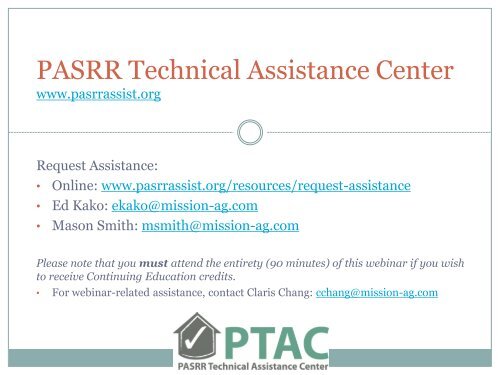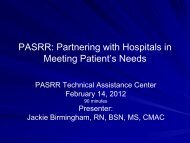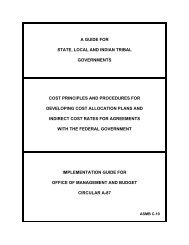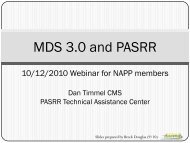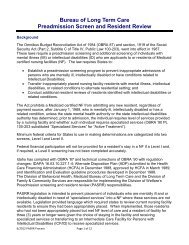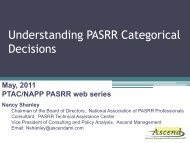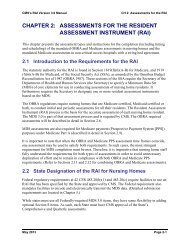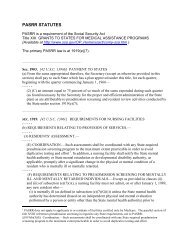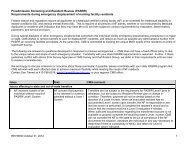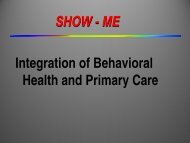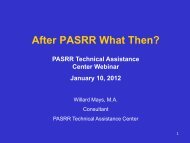PASRR APPEALS - PASRR Technical Assistance Center
PASRR APPEALS - PASRR Technical Assistance Center
PASRR APPEALS - PASRR Technical Assistance Center
Create successful ePaper yourself
Turn your PDF publications into a flip-book with our unique Google optimized e-Paper software.
<strong>PASRR</strong> <strong>Technical</strong> <strong>Assistance</strong> <strong>Center</strong><br />
www.pasrrassist.org<br />
Request <strong>Assistance</strong>:<br />
• Online: www.pasrrassist.org/resources/request-assistance<br />
• Ed Kako: ekako@mission-ag.com<br />
• Mason Smith: msmith@mission-ag.com<br />
Please note that you must attend the entirety (90 minutes) of this webinar if you wish<br />
to receive Continuing Education credits.<br />
• For webinar-related assistance, contact Claris Chang: cchang@mission-ag.com
September 10, 2013<br />
PTAC Webinar
Any party that is adversely affected by an agency decision is<br />
entitled to a review (42CFR 431.200 and 483.204). This includes<br />
non-Medicaid individuals adversely affected by <strong>PASRR</strong>.<br />
Medicaid adverse actions can be appealed through the state fair<br />
hearing process. Hearings can be either informal or formal.<br />
A Medicaid appeal is typically initiated in the form of a complaint<br />
issued often to a local eligibility office or to the designated state<br />
entity responsible for conducting administrative hearings.<br />
(Example: Inspector General’s office of administrative hearings).<br />
“Hearings are conducted by an independent neutral officer who<br />
writes decision based on program rules and regulations, the facts<br />
or evidence produced during the hearing. ” Source: Fl. Dept. of C&F<br />
Inspector Generals Office.<br />
States are required to have statutes, rules, and administrative<br />
procedures in place to outline hearings process.<br />
Medicaid appeals can also be filed judicially in civil court.<br />
3
NF applicant/resident does not meet level of care<br />
criteria required to qualify for the Medicaid<br />
Program (including service options<br />
/appropriateness)<br />
Time-limited/specified period determinations<br />
Determination that specialized services are<br />
needed/not needed<br />
Discharge from nursing facility<br />
Private pay applicant/resident appeals appealing<br />
adverse <strong>PASRR</strong> decision<br />
Other Medicaid/<strong>PASRR</strong> related issues (timeliness)<br />
4
States can opt to establish procedures to<br />
reconsider adverse action decisions. These<br />
procedures may incorporate a review of<br />
documents which led to the determination by<br />
different clinicians.<br />
Typically, agency responsible for decision<br />
incorporates process where other clinicians review<br />
LOC, Level II assessment, and/or need for<br />
specialized services (SS). SMHA or SIDA make<br />
determination as to whether SS needs can be met.<br />
Additional medical documents and psycho-social<br />
information can be submitted for review.<br />
Reconsideration process can avert appeals<br />
hearings.<br />
5
How state agency personnel can prepare for<br />
a hearing<br />
6
Once a complaint is filed with the state office, the<br />
hearing is scheduled and all parties are advised<br />
through written notice of hearing date, place, and<br />
time as well as hearing procedures (notice<br />
timeframes outlined in state administrative<br />
procedures).<br />
Some states initiate a concurrent reconsideration<br />
process.<br />
The recipients current eligibility remains the same<br />
until a decision is rendered.<br />
The location of hearing may vary from all parties<br />
(complainant, witnesses) appearing before hearings<br />
officer at state local/regional office to all parties<br />
attending by phone. The applicant must be<br />
accommodated based on their disability.<br />
7
Complainant or other parties may request a hearing be<br />
continued to another date if unable to attend; typically<br />
state procedures require request be made several days<br />
in advance (example 5 days in advance of hearing).<br />
Complainant has choice to:<br />
1) represent self at hearing<br />
2) choose a designated representative or<br />
3) select an attorney to represent them<br />
Designated representatives should have a written<br />
authorization signed by complainant.<br />
Legal representation may be obtained through private<br />
funds or publicly funded legal aide organizations.<br />
Attorney representing complainant may be required to<br />
file notice of appearance with Medicaid office, the<br />
hearing officer, and/or the state agency’s legal<br />
counsel.<br />
8
Complainant, designated representative, or<br />
attorney has the right to review the case file<br />
for information or documents that relate to<br />
issues to be discussed at the hearing.<br />
Complainant has right to copies of<br />
documents in file that resulted in<br />
determination.<br />
9
Make a list of points you or your attorney wish to<br />
present and want hearings officer to consider. You<br />
may wish to schedule a pre-hearing conference<br />
with your attorney in advance.<br />
Submit, or request your attorney to submit<br />
documents to the hearings officer in advance of<br />
scheduled hearing.<br />
Contact witnesses (MD, nursing facility, or hospital<br />
staff) to testify in support of your position at<br />
hearing or request hearings officer to issue<br />
summons or subpoenas to require attendance.<br />
10
States determine through statute (administrative<br />
procedures act) and rule (administrative code) how<br />
requirements will be met under 42 CFR 431.200<br />
Generally, hearings officer decides most orderly<br />
and practical way to proceed.<br />
Each party is allowed to present witnesses as well<br />
as other evidence to support their position.<br />
Each party is allowed to question the other party’s<br />
witnesses.<br />
Hearsay can be admitted during informal hearings;<br />
however final decisions are not based solely on<br />
witness statements made by another person before<br />
the hearing.<br />
11
Parties & witnesses who testify are sworn to tell the<br />
truth.<br />
Informal hearings are electronically recorded,<br />
therefore it’s important to speak loudly and clearly.<br />
Formal hearings may be recorded by a court reporter<br />
and available through transcription.<br />
Rules of evidence & testimony are applied in formal<br />
hearings.<br />
When the person who has filed request for hearing is<br />
NOT a current Medicaid recipient, the burden of<br />
proving that the state’s position be reversed may lie<br />
with them. This applies to formal/informal hearings.<br />
Conversely, for current Medicaid recipients, the<br />
burden of proof is placed upon the state.<br />
Decisions rendered by the hearing officer must be<br />
adhered to, including making changes retroactively.<br />
12
Impartial, independent, neutral<br />
No interest in hearing outcome<br />
Can ask witnesses questions for clarification<br />
Job is to evaluate position of each party and attempt to<br />
determine truth<br />
Can request or permit additional documents to be<br />
submitted following hearing<br />
Hearings officers may request either one or both<br />
attorneys to prepare recommended order(s)<br />
Decision rendered as final order based on program rules<br />
and regulations and facts produced during hearing<br />
Federal guidelines require order to issued within 90 days,<br />
this time can be extended<br />
Hearing officer ‘s decision is only device in rule that can<br />
countermand a <strong>PASRR</strong> determination<br />
Hearings officer’s order can be appealed to the<br />
appropriate District Court of Appeals<br />
13
Janet Spinelli PhD, RN, PCNS<br />
15
Background<br />
Different Perspectives & Special Considerations<br />
Components of Appeal Systems<br />
Differences in Appeal Systems<br />
Hearing Process<br />
Testimony & Useful Tips<br />
Issues in Appeals<br />
Best Practices<br />
Next Steps<br />
16
<strong>PASRR</strong> legislation emphasizes appeal rights<br />
Appeals can be a cumbersome process for<br />
individual, NF, and significant others<br />
<strong>PASRR</strong> appeal systems make opportunities<br />
for improving process or outcomes,<br />
minimizing adversities, complaints, and<br />
appeals<br />
Person-centered <strong>PASRR</strong> evaluation and<br />
determination approach can prevent<br />
complaints and appeals (i.e. personcentered<br />
evaluation, informed choice,<br />
outcome based determination, education)<br />
17
Olmstead v. L.C., 527 U.S 581 (1999) was decided by<br />
the Supreme Court of the United States in June 1999,<br />
finding that it is a direct violation of the Americans<br />
with Disabilities Act (ADA) of 1990 to retain<br />
individuals with mental disorders in institutional<br />
settings if their needs are able to be met in the<br />
community.<br />
SUPREME COURT OPINION IN OLMSTEAD<br />
“confinement in an institution severely diminishes the<br />
everyday life activities of individuals, including family<br />
relations, social contacts, work options, economic<br />
independence, educational advancement, and<br />
cultural enrichment.“<br />
Supreme Court of the United States No. 98-536<br />
http://www.ada.gov/olmstead/olmstead_about.htm<br />
18
Right to all the requirements of the <strong>PASRR</strong> program in a timely manner<br />
Right to service entitlements for Medicaid recipients<br />
Right to notice of appeal rights and being informed of service options<br />
Right to choose provider and service based on service options<br />
Right to be informed of respective costs that may be charged<br />
Not to be transferred or discharged without cause or notice<br />
Right to ask questions of an individual involved with the decisions<br />
Right to notification of appeal rights and appeal actions<br />
Right to access information on the appeal process (e.g. how to submit<br />
appeal, appeal procedures, levels of appeals)<br />
Right to make complaint or grievance without fear of retaliation<br />
Responsible to make any appeals within federal and state appeal<br />
guidelines<br />
Right to express personal preference/legal guardian’s preference<br />
Right to reasonable accommodations and individual consideration<br />
when establishing reconsideration and/or hearing forum<br />
Rights to respect, dignity, privacy/confidentiality.<br />
19
‣Responsible to provide a <strong>PASRR</strong> program based on<br />
federal and state rules, regulations, and laws<br />
‣Responsible to provide an appeal system<br />
‣Responsible for a state plan that appeal<br />
requirements are met<br />
‣Right to make a decision based on rules,<br />
regulations, and laws<br />
‣Right to counsel<br />
‣Right to appeal an administrative officer’s decision<br />
to the courts<br />
20
Content of Notice<br />
a) State, skilled NF, or NF intended action<br />
(b) Reasons for the intended action<br />
(c) Specific regulations or change in Federal /State<br />
law requiring action<br />
(d) An explanation of—<br />
(1) Individual's right to request an evidentiary<br />
hearing (if available), or a State agency hearing; or<br />
(2) In action under change in law, the circumstances<br />
a hearing will be granted; and<br />
(e) An explanation of circumstances which Medicaid<br />
is continued if hearing is request.<br />
See Content of notice and notice § 431.210 and § 431.206<br />
(c)(2), (c)(3), or (c)(4)<br />
21
For any person adversely affected by the preadmission<br />
screening or resident review<br />
Medicaid and non-Medicaid individuals<br />
appealing transfers, discharges and<br />
determinations of preadmission screening &<br />
resident reviews<br />
A termination, suspension, or reduction of<br />
Medicaid eligibility or covered services<br />
Determinations by skilled NF and NF to transfer<br />
or discharge residents<br />
Adverse Determinations: Does not require the<br />
level of services provided by a NF<br />
Does or does not require specialized services<br />
22
CHOICE & APPEAL RIGHTS<br />
<br />
Individual with MI or ID/related conditions should be<br />
provided choice to access NF services, should their<br />
condition require the level of service and their needs can<br />
be appropriately met in a NF.<br />
<br />
<br />
<br />
Individuals with a mental disability or ID/related conditions<br />
should be given the opportunity to have their needs met in<br />
community options, even if they meet the rule-based<br />
standard for institutional placement.<br />
There should be appropriate weight assigned to the<br />
consumers/guardian’s choice to live in a particular setting.<br />
There should be access to appeal system.<br />
23
Notice on special procedures to access any<br />
restricted mental health record (make an appoint<br />
with MH providers to access information from<br />
health record)<br />
Guardian notification –(locating guardian)<br />
Special procedures for individuals with evidence of<br />
decision making issues<br />
Accommodations for disabilities<br />
Individual circumstances/preferences guide<br />
reconsideration, informal and/or formal hearing<br />
procedures (timing/platform)<br />
24
‣Determination and notice process: Person-centered<br />
& outcome based determinations<br />
‣Notification of action<br />
‣Submission process for complaints & appeals<br />
‣Complaint and appeal data receiving procedures<br />
‣Appeal classification, coordination, & scheduling<br />
‣Investigation and complaint resolution strategies<br />
‣Reconsideration procedures<br />
‣Hearing procedures and decision(s)<br />
‣Collect quality improvement data for continuous<br />
quality improvement: procedure for policy review &<br />
procedure for policy revision<br />
25
Different state offices responsible for various <strong>PASRR</strong><br />
related hearings (e.g. Appeal office, MH, ID/DD, Medicaid<br />
authority, Attorney General office)<br />
Different agency staff participate in state reconsideration<br />
related activity<br />
Different agency representatives at hearings (e.g. <strong>PASRR</strong><br />
/Agency administrator knowledgeable of the case, staff<br />
who took action (i.e. completing <strong>PASRR</strong> evaluation data<br />
and/or determination)<br />
Agency Representative may testify based on (1) a record<br />
evaluation (2) face-to face assessment, and/or (3) a case<br />
review<br />
Different terminology (e.g. appeals officer, appeals<br />
administrator, intermediary/case coordinator, agency<br />
representative)<br />
Different classification of complaints and appeals<br />
◦ Use of appeal request forms to classify complaints and appeals<br />
◦ Use of Appeal officers to classify complaint into adverse decision<br />
categories<br />
26
Appeal related data entered into shared database for<br />
administration, prehearing and hearing procedures<br />
◦ Record sharing procedures<br />
◦ Agency provides individual and hearing officer adverse<br />
determination notice; documents on rationale for decision<br />
◦ Investigations<br />
◦ Multidisciplinary meetings may include:<br />
• Individual and/or legal guardian, representative (written<br />
signed document authorizing ) or authorized advocate<br />
• State and local provider agencies<br />
• MH, DD Health care providers<br />
• Options counselors including MFP<br />
• NF Ombudsman or NF surveyor agency<br />
• Family or Significant others<br />
27
Dress appropriately<br />
Avoid argumentative discussions<br />
Due diligence to see facts<br />
Answer questions, OK to say I don’t know<br />
Present clearly<br />
Present “black and white” factual data<br />
Provide supplement data throughout the oral<br />
proceedings<br />
Have supportive documents<br />
28
Have a defined process for hearings<br />
Script is written around/reinforces legal<br />
regulations and rules<br />
Work collaboratively with Attorney<br />
• Seek support from attorney to write script<br />
• Have script around state policy/reinforces legal regulation<br />
Be aware of established practices expected by<br />
hearing officer<br />
Be aware that hearing decisions are rendered<br />
based on entire hearing “record”-not just<br />
testimony<br />
29
Avoid deviation from procedure based<br />
decision making<br />
◦ Confusing ancillary or unrelated data<br />
• Can suggest that decision was not based on rules<br />
• Can suggest that decision was made arbitrary and<br />
capricious<br />
Documentation is critical<br />
◦ Clinical documentation<br />
◦ Action taken for complaint<br />
◦ All action documentation<br />
◦ Timeliness documentation<br />
30
Every administrative hearing has distinct<br />
components: (e.g. direct testimony, crossexamination,<br />
additional testimony, and a<br />
closing statement.)<br />
Statement by agency representative<br />
describing agency policy for action taken<br />
Statement by claimant or authorized<br />
representative<br />
Hearing Officer lead discussion on policy and<br />
related facts<br />
31
Hearing Officers Opening Role<br />
◦ Opening the hearing<br />
◦ Describe reason for hearing<br />
◦ Identify and confirm attendance of parties needed<br />
to conduct fair hearing proceeding<br />
• Discontinue hearing for absent attendee<br />
• An informal or formal reconsideration proceeding<br />
may occur after hearing officer discontinued<br />
hearings or dismiss themselves<br />
◦ Describe and clarify hearing procedures for one or<br />
more adverse action issues<br />
◦ Explain the determination notification procedure<br />
used to inform the individual of the adverse<br />
determination<br />
32
Establish role and credentials<br />
Rules and regulations the action was based on<br />
When received or completed information used<br />
in determination<br />
State who received evaluation material from<br />
Date evaluation was done<br />
When received evaluation<br />
Define documentation<br />
33
Show clinical definitions/medical necessity policy<br />
◦ Policy may have all affirmative requirements<br />
◦ Policy includes criteria a, b, c<br />
Show how clinical criteria matches regulations<br />
◦ Write up the steps in the decision making process<br />
Show how clinical decision making went through<br />
process<br />
Define how determine criteria is not detailed in data<br />
Show discrepancies to clearly see what is lacking<br />
◦ State reason denying due to...<br />
◦ State where clinical findings/documentation does<br />
not match criteria<br />
Summarize<br />
◦ State did not meet criteria<br />
◦ State did not meet all criteria<br />
34
Timeliness on notice & determination<br />
Timeliness for complaint<br />
Determination of needed services in<br />
appropriate placement determinations<br />
Addressing access to service benefits:<br />
clarifying process and responsible parties (i.e.<br />
state, individual, contractor, provider) for<br />
timely data and forms completed<br />
Develop understanding of what happens with<br />
services during various appeal processes<br />
Identifying adverse consequences<br />
Challenges in application of CFR 483.138<br />
35
Review NF LOC hearing forum<br />
Service authorization hearings<br />
Disability review organization<br />
Eligibility determinations<br />
Look at policies<br />
Prehearing activities and reconsideration<br />
Hearing preparation<br />
Timeliness determination management (when<br />
sent out action/determination)<br />
Special procedures and lessons learned<br />
System reform based on findings<br />
36
Maximize transparency in determination & appeal<br />
Person-centered/ outcome based determinations,<br />
incorporation of section Q in <strong>PASRR</strong> outcomes,<br />
following up confirmation of discharge location<br />
Correspondence/cover letter describing rights<br />
Hearing schedule notices (prior to hearing, for parties<br />
failing to appear)<br />
Reconciliation and prehearing complaint resolution<br />
Web based procedure Instructions<br />
Procedure manual<br />
37
Training power point presentation<br />
Appeal system policies and procedure manual<br />
Delineate complaints and appeals on appeal request<br />
forms<br />
Scenario based training<br />
Written state testimony summary sent out prior to<br />
hearing<br />
Appeals officer cheat sheet<br />
Appeal summaries-summarize state’s action and<br />
regulation basis<br />
Quality improvement feedback procedures<br />
Self evaluation<br />
38
Accessible laws, rules, regulations, and<br />
procedures<br />
Learn from past practice<br />
Review other state procedures<br />
Use brochures and training tools<br />
Networking<br />
Self evaluation<br />
Learn from scenario<br />
39
What is appealable?<br />
What is state timeframe/process to file appeals?<br />
Is there available information and instruction for<br />
appeal rights and pre-hearing procedures?<br />
What happens with services during various<br />
appeal processes?<br />
Is medical necessity determination consistent<br />
with policies describing eligibility requirements?<br />
Do appropriate placement determinations<br />
conflict with policy eligibility requirements?<br />
Are adverse appropriate placement<br />
determinations based on issues of unmet need?<br />
Other questions?<br />
40
Follow up discussion<br />
Differences in implementation strategies<br />
Networking support and strategies<br />
Brandon Sturgill, Ohio Hearing Coordinator,<br />
Office of Treatment & Recovery will provide<br />
more detailed examples from Ohio<br />
program<br />
41
Questions<br />
Contact information:<br />
Sam Fante, National Association of <strong>PASRR</strong> Professional Chair<br />
fantes18@yahoo.com<br />
Janet Spinelli PhD, RN, PCNS<br />
janetspin@aol.com<br />
Brandon Sturgill, Ohio Hearing Coordinator, Office of Treatment & Recovery<br />
brandon.sturgill@mha.ohio.gov<br />
42


